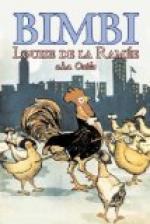But what could he do?
There was the snow, indeed, and there were the mountains, as in the fourteenth century, but there were no travelers lost. The diligence did not go into Switzerland after autumn, and the country people who went by on their mules and in their sledges to Innspruck knew their way very well, and were never likely to be adrift on a winter’s night, or eaten by a wolf or a bear.
When spring came, Findelkind sat by the edge of the bright pure water among the flowering grasses, and felt his heart heavy. Findelkind of Arlberg who was in heaven now must look down, he fancied, and think him so stupid and so selfish, sitting there. The first Findelkind, a few centuries before, had trotted down on his bare feet from his mountain pass, and taken his little crook, and gone out boldly over all the land on his pilgrimage, and knocked at castle gates and city walls in Christ’s name and for love of the poor! That was to do something indeed!
This poor little living Findelkind would look at the miniatures in the priest’s missal, in one of which there was the little fourteenth-century boy with long hanging hair and a wallet and bare feet, and he never doubted that it was the portrait of the blessed Findelkind who was in heaven; and he wondered if he looked like a little boy there, or if he were changed to the likeness of an angel.
“He was a boy just like me,” thought the poor little fellow, and he felt so ashamed of himself—so very ashamed; and the priest had told him to try and do the same. He brooded over it so much, and it made him so anxious and so vexed, that his brothers ate his porridge and he did not notice it, his sisters pulled his curls and he did not feel it, his father brought a stick down on his back and he only started and stared, and his mother cried because he was losing his mind and would grow daft, and even his mother’s tears he scarcely saw. He was always thinking of Findelkind in heaven.
When he went for water, he spilt one-half; when he did his lessons, he forgot the chief part; when he drove out the cow, he let her munch the cabbages; and when he was set to watch the oven, he let the loaves burn, like great Alfred. He was always busied thinking: “Little Findelkind that is in heaven did so great a thing: why may not I? I ought! I ought!” What was the use of being named after Findelkind that was in heaven, unless one did something great, too?
Next to the church there is a little stone lodge, or shed, with two arched openings, and from it you look into the tiny church with its crucifixes and relics, or out to the great, bold, sombre Martinswand, as you like best; and in this spot Findelkind would sit hour after hour, while his brothers and sisters were playing, and look up at the mountains or on to the altar, and wish and pray and vex his little soul most woefully; and his ewes and his lambs would crop the grass about the entrance, and bleat to make him




